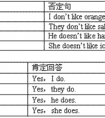用所给的单词的适当形式填空。1. I'm good at _____(swim).2. Everyone in our class _____(like) to play this game.3. Mr Li told us _____(not play) on the road.-八年级英语
foot→feet(脚)
tooth→teeth(牙)
mouse→mice(老鼠)
ox →oxen(公牛)
goose→geese(鹅)
2.单复同形:
deer,sheep,fish,Chinese,Japanese, species,means,Swiss
除人民币,美元、英镑、法郎等都有复数形式。
如:a dollar,two dollars; a meter,twometers
3.集体名词,以单数形式出现,但实为复数:
people police cattle是复数
(OK :a person,a policeman,ahead of cattle,the English,the British,the French,the Chinese,the Japanese,the Swiss )
(Error:a people,a police,a cattle )
表示国民总称时,作复数用。
(The Chinese are industries and brave. 中国人民是勤劳勇敢的。)
4.以s结尾,仍为单数的名词
maths,politics,physics等学科名词,为不可数名词,是单数。
news是不可数名词。
5.表示由两部分构成的东西,
glasses(眼镜) trousers (长裤) clothes(衣服)
若表达具体数目,要借助数量词pair(对,双)a pair of glasses two pairs of trousers suit(套)
6.另外还有一些名词,其复数形式有时可表示特别意思
goods (货物) waters (水域) fishes (各种鱼)
1) 单数名词加s: students, apples, bags, trees, books, brothers.
2) 以s、x、sh、ch结尾的名词加es: glasses, boxes, brushes, matches.
3) 以辅音字母加y结尾的名词,变y为i加es: cities, babies, enemies.
4) 以f或fe结尾的名词,多数变f为v加es: wives, knives.但有些词只加s: roofs,proofs, chiefs.
5) 以o结尾的名词,有些加es: Negroes, heroes, tomatoes, potatoes. 其它加s: radio s, zoos, pianos, photos.
6) 不规则名词:foot→feet, goose→geese, tooth→teeth, child→children, man→men, woman→women, mouse→mice.
7) 单复数同形的名词:sheep,fish,dee.
注意:fish表示种类时,也用fishes这样的形式。
考点名称:形容词的比较级,形容词的最高级
- 形容词的比较级:
当两种物体之间相互比较时,我们要用形容词或副词的比较级;
当相互比较的物体是三个或三个以上时,我们就要用形容词或副词的最高级。 形容词的比较级和最高级的特殊变化规则:
一、少数单音节词前面加 more-, most- 构成比较级和最高级
tired ---- more tired , most tired
fond ----- more fond , most fond
glad ----- more glad , most glad
bored ---- more bored , most bored
pleased---- more pleased , most pleased二、不规则变化
good /well------- better ,best
bad/badly/ill------ worse , worst
many/much-------more , most
little ------ less , least
far ---- farther, farthes / firther , furthest
old ---- older , oldest (GA)
---- older , oldest / elder , eldest (GB)三、下列形容词和副词的比较级和最高级有两种形式
cruel----- crueler, cruelest /more cruel , most cruel
strict---- stricter , strictest /more strict , most strict
often----- oftener , oftenest / more often , most often
friendly------ friendlier , friendliest / more friendly , most friendly
clever----- cleverer, cleverest / more clever , most clever四、下列形容词和副词没有比较级和最高(即表示”最高程度”或”绝对状态”的形容词和副词没有比较级和最高级)
empty , wrong , perfect , unique , extreme , excellent , favourite (GB)/ favorite (GA) , true , right , correct , extremely ...- 形容词的比较级和最高级用法:
形容词比较等级用法:
1.没有比较对象时,用原级。
I have a new computer.
2.两者比较,程度相同。
A+系动词+as+adj.+as+B.
Our school is as beautiful as theirs.
3.两者比较,程度不同。
A+系动词+not as+adj.+as+B.
The weather here is not as hot as that in the south.
4.A比B更…
The earth is bigger than the moon.
5.比较级前可以用much,even,still,far,a lot,a little,a bit,any等修饰。
Your room is much bigger than mine.
I’m a little shorter than her.
6.用比较级可以表示最高级含义:
John is stronger than any other boy in his class.=John is stronger than any of the other boys.
两者不属于同一范畴,不能用other.
Chongqing is bigger than any city in Sichuang.
7.“比较级+and+比较级” 表示“越来越…”
China is becoming more and more beautiful.
Days are getting longer and longer.
8.用the+比较级,the+比较级 表示”越…就越…”.
The busier he is, the happier he feels.
9. Which/Who+is+比较级 A或B?
A和B哪一个/谁更…?
Which is better,this one or that one?
最高级用法:
表示三者或三者以上的人或物的比较,一个在某方面超过其他两个或多个时,用最高级,结构是
主语+系动词+the+形容词最高级+of/in短语。
This story is the most interesting of the three.
1. one of the+形容词最高级+名词复数
它的意思是最…之一。
English is one of the most important languages in the world.
2. which/who…+is+形容词最高级
“…最...”
Which is the heaviest,the horse,the sheep or the elephant?
3.最高级前可以用序数词
The Yellow River is the second longest river in China. - 形容词的比较级和最高级的变化规则:
构成
原级
比较级
最高级
一般加er,est
tall
taller
tallest
以字母e结尾只
加 r,stlarge
larger
largest
以一个辅音字母结尾的
重读闭音节,双写这一辅
音字母后再加er,estred
redder
reddest
hot
hotter
hottest
thin
thinner
thinnest
以辅音字母+y结尾的词,
将y变为i再加er,esteasy
easier
easiest
happy
happier
happiest
ugly
uglier
ugliest
early
earlier
earliest
其他双音节词和多
音节词,在词前
加more或mostinteresting
more interesting
most interesting
考点名称:不定式
- 动词不定式:
指由to加上动词原形(而且只能是动词原形)所构成的一种非限定性动词,但在有些情况下to可以省略。
动词不定式在语法功能上可作主语、宾语、宾语补足语、表语、定语和状语。
- 最新内容
- 相关内容
- 网友推荐
- 图文推荐
| [家长教育] 孩子为什么会和父母感情疏离? (2019-07-14) |
| [教师分享] 给远方姐姐的一封信 (2018-11-07) |
| [教师分享] 伸缩门 (2018-11-07) |
| [教师分享] 回家乡 (2018-11-07) |
| [教师分享] 是风味也是人间 (2018-11-07) |
| [教师分享] 一句格言的启示 (2018-11-07) |
| [教师分享] 无规矩不成方圆 (2018-11-07) |
| [教师分享] 第十届全国教育名家论坛有感(二) (2018-11-07) |
| [教师分享] 贪玩的小狗 (2018-11-07) |
| [教师分享] 未命名文章 (2018-11-07) |

![Which of the following can you probably see in the meeting room? [ ]A. B. C.D. -七年级英语](http://www.00-edu.com/d/file/ks/4/2/dongmingci/2020-01-08/small97361980a56115e1c9237567439904fe1578422951.jpg)

![—Can the boy finish_____ the book in about a week? —I think he can. [ ]A. read B. reading C. to read D. reads -八年级英语](http://www.00-edu.com/d/file/ks/4/2/dongmingci/2020-01-08/smallfa4d713075e249356362fe7392193a301578421751.png)


